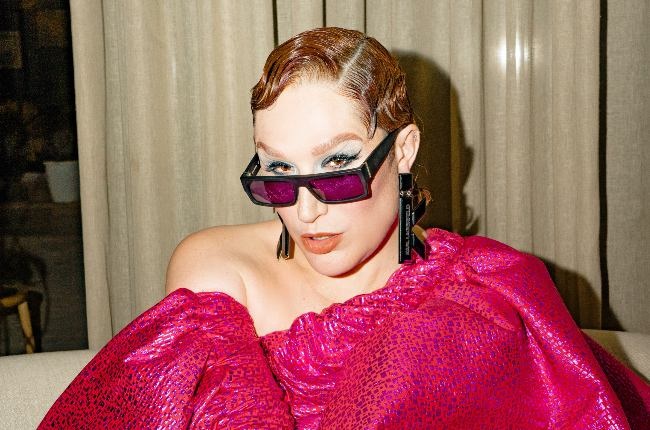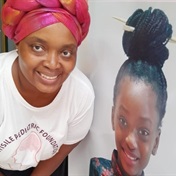
She is one of Mzansi’s fashion icons whose star started rising in the early 2000s along with kwaito stars TKZee, Trompies, Mdu Masilela and Malaika.
She had rhythm and could hold down any dancefloor from a tavern to a nightclub or parliament opening, and even a wedding.
Adored by many, singer and songwriter Tamara Dey entertained South Africans across all racial lines and was known for her signature Saturn gloves mixed with street style.
This year the Kwaito, disco-pop, and house singer celebrates 20 years in the music industry.
She has come a long way from being the young, carefree girl she started off as and says she owes her success to the rich African culture and house music influence.
“I definitely started in the era of TKZee, Trompies, Mafikizolo, and so forth. This was an incredible and special time in music,” she tells Drum.
“I am very nostalgic about this time as I got such a beautiful and warm welcome into the industry from audiences and artists. I got to travel the country with them and got to see things that not many could experience. It was a time when Kwaito and house were at the forefront and then things were very musical,” she says.
“There was a lot of joy in the world and in music. Now things have evolved. We have seen many subgenres that have come out like Gqom and amapaino with the roots of house and Kwaito. My music will always be rooted in house music. It’s a very exciting time in music now and the best music comes out of hard times and we have seen hard times,” she says.
One of the most memorable moments in her career was when she was in the studio and recorded the vocals for Thathi Mpahla with Oskido and Bruce Sebetlo.
“I had no idea who they were in the bigger scheme of things. I was young and didn’t know they were the forefathers of Kwaito and this big radio DJ. I was very naïve, and I remember being in university and driving to McDonalds with a couple of my friends in the car and my song came on the radio. I didn’t know my song was going to get played and how it got onto the radio. But we all heard it and we absolutely freaked out. I will never forget that moment, it was so surreal and special,” she says.
“There have been so many but in my run with Flash Republic, my dancers were incredible, we got to tour overseas and work on many projects together. On project Killer Love had seven radio singles, one after the other and it was incredible. We had one hit after the next and we were having the time of our lives and headlining the biggest festivals,” she says.
“We have since lost one of our members and DJ, Craig Mathis who passed away last year. It has been a tragedy, but I honour him with the memory of Flash Republic. His presence is sorely missed, and I know he is watching over me now and supporting me. Those years were unbelievable and I am very proud of the music we make,” she says.
Read more l ‘I started speaking out and doors closed in my face’ - Why Portia Modise won't stop fighting for equality
On 2 September, Tamara released her new single titled Disco Therapy, an ode to her love for house music.
“It is a beautiful disco house track, it is incredibly musical and layered with little elements of throwbacks, and pop futurism,” she says.
“It is inspired by the healing power of music. We have been through so much adversity for the past couple of years and we need to turn back to music for the healing that we need.”
She wanted to bring a lot of love and light and get people out of their chairs and into dance floors with hopes in their hearts.
“Music has always been an important element in my life, with bad and good moments there has been a soundtrack,” she says.
“So this song has been a healing experience for me too, a lot of heart and soul went into it, and I have always loved house music and it has been at the core of everything I do.”
The last song she released was with Mobi Dixon titled Lock Me Up.
“I released it independently from my bedroom during the lockdown. But I also featured in his project on a song titled Closer. I love working with Mobi and before that was Colours with DJ Zinhle,” she says.
Read more l Sipho Ngwenya on getting his MBA, the baby on the way, fatherhood, and marriage
Tamara started singing in clubs at 16 years old. She would escape home through her bedroom window to perform with drum and bass music DJs at nightclubs around Pretoria and Johannesburg.
“But by then, I was already in a band. I started really young, and I have grown so much. I have certainly changed a lot and come into myself. I have stepped into my power a lot. I have tapped into my unique style on stage with fashion and performance. This is something that happens over time as you get to know yourself as an artist and as you grow in confidence and experience. You really kind of evolve and hone your craft certainly my experiences have gotten more polished from the years of experience,” she says.
“My first single was Thathi Mpahla Yakho which I dropped when I was just out of high school around 2001. I have been around in the music game for about 20 years and still going strong. I am not going anywhere. I will make music until I die. I will retire when I’m dead,” she laughs.
“I am still very passionate and there is still lots of music coming my way. I continue to learn with each project, song, and gig. I will never stop learning and I love that process and the journey of self-discovery and exploring music with different genres. It brings me great joy and having people along with me for the ride is beautiful.”
Her brand has evolved with her stepping into her power as art director of everything.
“I have worked with incredible people and my team has been important and how the look, sound, music video, and how everything comes together. I have been able to produce my own music videos and style my own shoots. I have stepped into all those roles in a bigger way than before,” she adds.
While being stylish and making hits, she is also a mom to baby girl Lalabella.
“Being able to experience motherhood and have this incredible little soul, my daughter Lalabella come into my life has been an honour,” she says.
“It has been an incredible journey having her as part of our family. She is a ball of light and love. The most amazing realisation has been that we don’t just raise our children, but our children raise us. Since I have had her, my soul has not stopped expanding," she says.



















